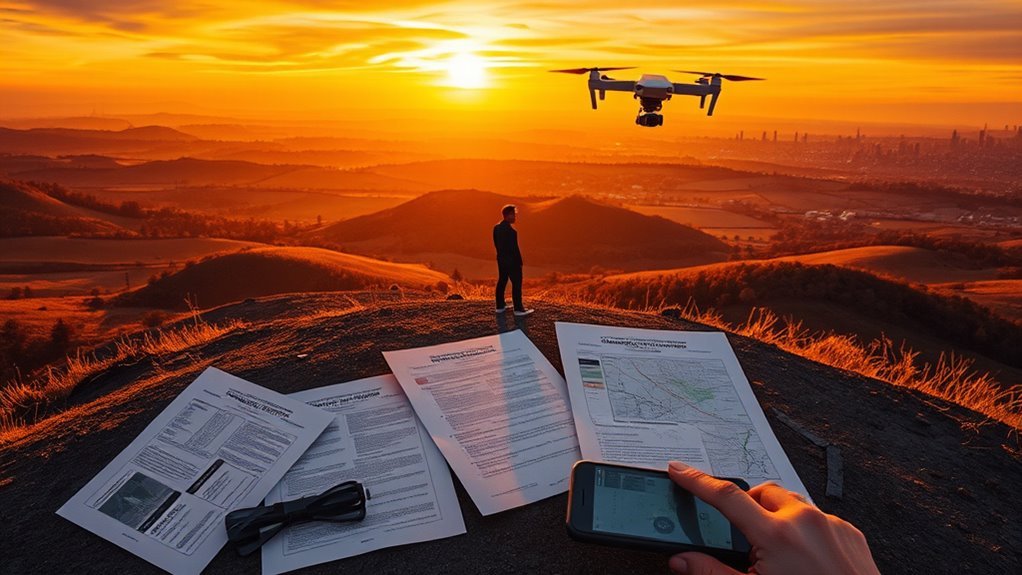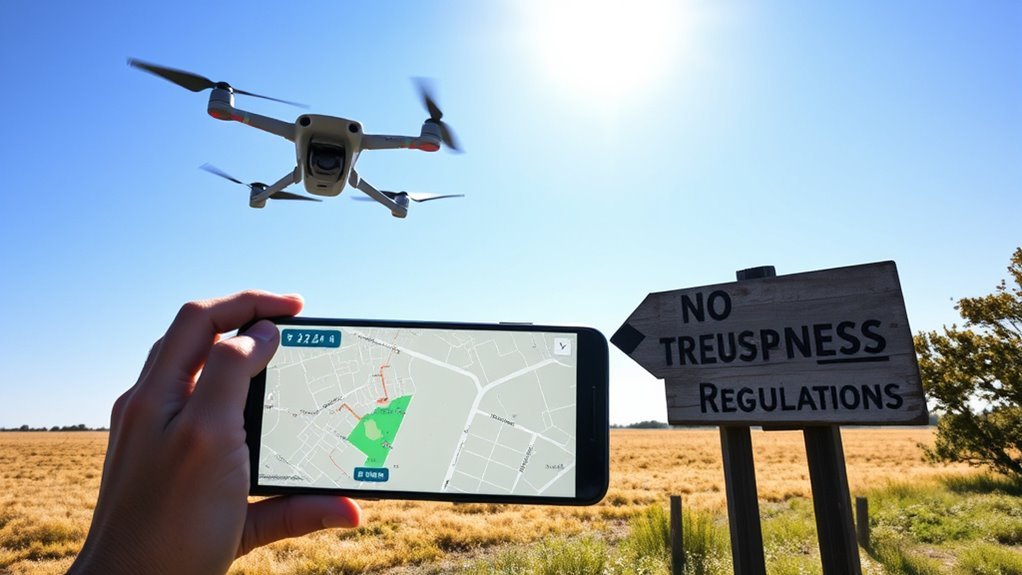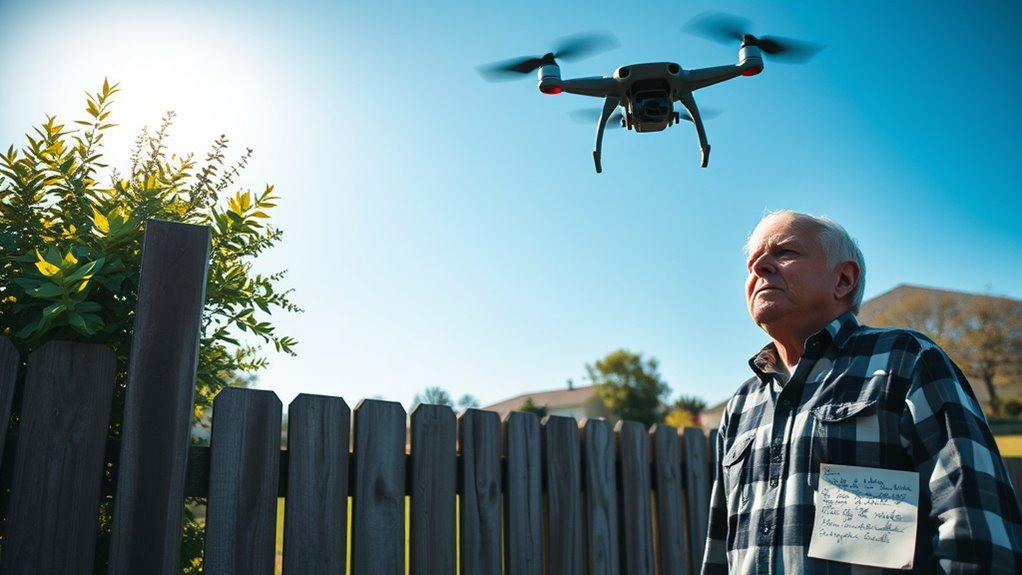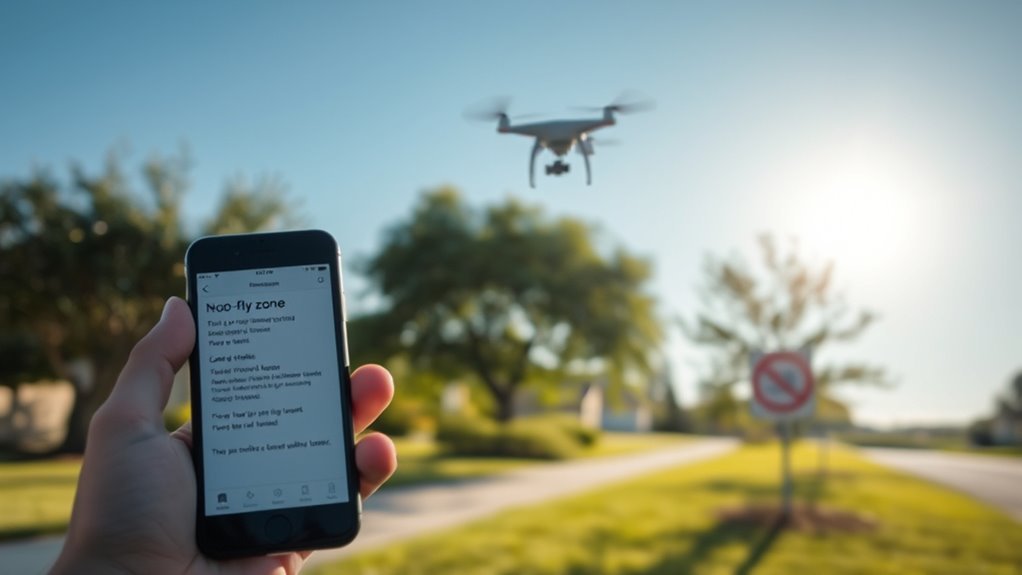To determine if it’s legal to shoot down drones in your area, you must navigate federal, state, and local regulations. The FAA sets strict guidelines on drone operations, including airspace limitations. Many states have laws prohibiting shooting down drones, while others allow it under specific conditions. Understanding your property rights and the potential legal consequences—like criminal charges and civil liability—is essential. For a deeper understanding of your rights and responsibilities, explore the complexities of drone laws further.
Understanding Drone Laws in Your Jurisdiction

When considering the legality of shooting down a drone, it is crucial to understand the specific laws governing drone use in your jurisdiction, as these can vary considerably. Many areas have laws that protect drone privacy, meaning you might not have the right to destroy a drone simply because it’s hovering over your property. Aerial trespassing can complicate matters further, as what constitutes trespassing in the air isn’t universally defined. Investigate local regulations carefully; some jurisdictions may allow for defensive actions if a drone poses a threat, while others strictly prohibit any form of interference. Additionally, be aware that federal regulations supersede individual claims to airspace control, which can impact your legal options. Understanding airspace ownership is vital for determining how to respond to potential violations of your privacy without risking legal consequences.
Federal Regulations Governing Drone Use

When considering the legality of shooting down drones, you need to understand the federal regulations that govern their use. The FAA has established specific guidelines for drone operation, along with airspace control laws that dictate where drones can legally fly. Familiarizing yourself with these regulations is essential to determining whether any action you might consider is permissible under federal law.
FAA Drone Regulations
Although the rise of drone technology has transformed various sectors, it’s important to understand the FAA’s regulations governing their use. These rules are designed to guarantee safety and protect drone privacy, preventing incidents like aerial trespassing. The FAA mandates that drone operators adhere to specific guidelines, such as flying below 400 feet and avoiding restricted airspace. You need to be aware that while you may feel justified in defending your property, shooting down a drone could violate federal laws. Understanding these regulations not only protects your rights but also preserves the integrity of airspace. Before taking any action against a drone, familiarize yourself with the FAA’s framework to avoid legal repercussions and safeguard your freedoms remain intact.
Airspace Control Laws
While drone technology has rapidly advanced, understanding airspace control laws is crucial for anyone considering taking action against a drone. Airspace sovereignty grants you certain rights over the airspace above your property, but these rights are nuanced. The Federal Aviation Administration (FAA) establishes regulations that often prioritize drone operations, limiting your ability to act against unauthorized drones. When you perceive a drone as trespassing, it’s essential to recognize that shooting it down could violate federal laws and result in severe penalties. Before taking any action, familiarize yourself with local laws and FAA regulations to guarantee you’re within legal boundaries. Knowing your rights and the regulations governing drone trespass can help you make informed decisions while protecting your freedom.
State and Local Drone Regulations

As drones proliferate in both commercial and recreational contexts, understanding state and local regulations becomes essential for anyone considering the legality of shooting one down. State drone laws vary markedly, with some states explicitly prohibiting the destruction of drones, while others may allow it under specific circumstances. Local drone policies can further complicate the landscape, as municipalities may enact their own rules governing drone operations. Always check your local ordinances and state statutes to guarantee compliance. Ignoring these regulations can lead to serious legal repercussions, undermining your desire for freedom. If you’re contemplating taking action against a drone, knowing the specific laws in your area is imperative to avoid unintended consequences and to protect your rights effectively.
Property Rights and Airspace Ownership
Understanding property rights and airspace ownership is essential when evaluating the legality of shooting down a drone. Generally, property boundaries extend from the ground up to a certain height, granting you airspace rights above your land. However, these rights can be complex. The Federal Aviation Administration (FAA) regulates airspace usage, often asserting that drones can legally operate above your property without permission. This means that while you might feel justified in protecting your privacy and property, the legality of shooting down a drone can be murky. It’s important to recognize that your rights may not extend to the airspace the drone occupies, complicating any actions you might consider taking against unwanted aerial intrusions. Always consult local laws for clarity.
Self-Defense and the Use of Force
When considering the legality of shooting down a drone, you need to assess whether self-defense justifies your actions. This involves evaluating if there’s an imminent threat and whether your response meets the standards of reasonable force. Understanding these criteria is essential in determining the legal boundaries of self-defense in this context.
Justification for Self-Defense
Determining whether shooting down a drone can be justified as an act of self-defense requires a careful analysis of the circumstances surrounding the incident. In self-defense scenarios, you must consider:
- Imminence: Does the drone pose an immediate threat to your safety?
- Proportionality: Is shooting it down a reasonable response to the perceived danger?
- Intent: What is the drone’s purpose—surveillance, harassment, or something more sinister?
- Legal Precedents: Are there any existing legal rulings that support your right to act in this manner?
Understanding these factors can guide your decision-making process and guarantee that your actions align with both self-defense principles and applicable laws. Always consult local laws, as they vary considerably and can impact your rights.
Reasonable Force Standards
While evaluating the legality of shooting down a drone, it is vital to grasp the standards of reasonable force that govern self-defense and the use of force. Reasonable force refers to the minimum necessary action you can take to protect yourself or your property against a perceived threat. In drone defense, consider whether the drone poses an imminent danger or intrudes on your privacy. Courts typically assess the proportionality of your response; shooting down a drone might be seen as excessive unless it represents an immediate threat to safety or security. As a result, understanding these standards is significant in determining if your actions align with legal expectations surrounding reasonable force in drone situations. Always prioritize de-escalation and exploring non-lethal alternatives first.
Potential Legal Consequences of Shooting Down a Drone
Shooting down a drone, regardless of the circumstances, can lead to significant legal repercussions that vary by jurisdiction. Understanding these potential consequences is essential for anyone considering such an action:
- Criminal Charges: You might face felony or misdemeanor charges, depending on intent and local laws.
- Civil Liability: If you damage property or injure someone, you could be held financially responsible.
- Fines: Monetary penalties can be imposed, which may increase with the severity of the incident.
- Legal Fees: Defending against charges or claims can rack up substantial legal costs.
The risks associated with shooting down a drone can outweigh any perceived benefits, so it’s important to know the law before taking action.
Alternative Ways to Address Drone Concerns
Given the potential legal ramifications of taking direct action against a drone, exploring alternative methods to address your concerns is essential. You might consider discussing your drone privacy worries with the drone operator, if identifiable. This could foster understanding and potentially resolve issues amicably. Additionally, documenting instances of aerial trespassing can support your case when addressing local authorities or advocating for policy changes. Joining community groups focused on drone regulation may amplify your voice and unite efforts for better legislation. Educating yourself and your neighbors about drone laws and privacy rights can empower you to take informed action, as understanding state laws can help clarify your rights and options. Ultimately, fostering dialogue and advocating for stronger regulations can effectively address your drone concerns while preserving your freedom. Moreover, implementing proactive vulnerability identification can enhance community safety measures against potential drone misuse.
Consulting Legal Experts on Drone Issues
When facing concerns about drone activity, consulting legal experts can provide crucial insight into your rights and possible actions. Here are four key reasons to seek legal consultations regarding drone disputes:
- Understanding Local Laws: Legal experts can clarify the specific laws governing drone use in your area.
- Assessing Your Rights: They can help you understand your rights concerning privacy and property.
- Evaluating Legal Risks: Experts can outline potential legal consequences of taking action against a drone.
- Navigating Conflict Resolution: They can guide you through formal dispute resolution processes, should you need to escalate the issue.
Frequently Asked Questions
Can I Shoot Down a Drone if It Invades My Privacy?
You can’t just shoot down a drone invading your privacy; it’s essential to understand privacy laws and drone rights in your area. Legal consequences might outweigh any perceived invasion, so always check local regulations first.
What Should I Do if a Drone Is Hovering Over My Property?
If a drone’s hovering over your property, it’s essential to understand drone privacy laws and your property rights. Document the situation, consider notifying authorities, and explore legal options before taking any drastic actions.
Are There Specific Drone Hunting Regulations I Need to Know?
You need to understand drone hunting laws in your area, as they dictate drone shooting permissions. It’s essential to research local regulations, as violating them could lead to legal repercussions and unintended consequences.
How Do I Report a Drone That Feels Threatening?
If a drone’s buzzing feels like an unwelcome shadow, you should follow drone reporting procedures. Document details, contact local authorities, and be aware of the legal implications to guarantee your rights remain protected.
Can I Use a Drone Jammer to Disable Unauthorized Drones?
Using a drone jammer for unauthorized drone interference can be legally problematic. You’ll need to research drone jamming legality in your area, as laws often prohibit such actions, potentially leading to serious legal consequences.

